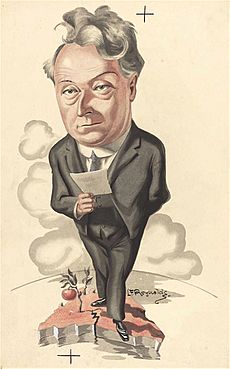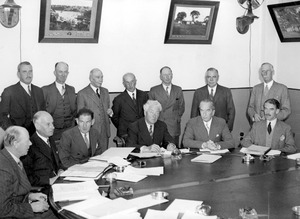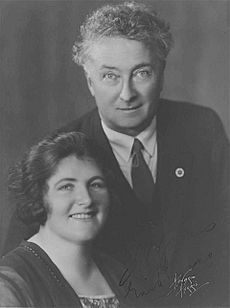Joseph Lyons facts for kids
Quick facts for kids
Joseph Lyons
|
|
|---|---|

Lyons in the 1930s
|
|
| 10th Prime Minister of Australia | |
| In office 6 January 1932 – 7 April 1939 |
|
| Monarch | George V Edward VIII George VI |
| Governor-General | Sir Isaac Isaacs Lord Gowrie |
| Deputy | John Latham Earle Page |
| Preceded by | James Scullin |
| Succeeded by | Earle Page |
| Leader of the Opposition | |
| In office 7 May 1931 – 6 January 1932 |
|
| Prime Minister | James Scullin |
| Deputy | John Latham |
| Preceded by | John Latham |
| Succeeded by | James Scullin |
| 26th Premier of Tasmania | |
| In office 25 October 1923 – 15 June 1928 |
|
| Governor | Sir James O'Grady |
| Preceded by | Sir Walter Lee |
| Succeeded by | Sir John McPhee |
| Leader of the United Australia Party | |
| In office 7 May 1931 – 7 April 1939 |
|
| Deputy | John Latham Robert Menzies |
| Preceded by | Position Established |
| Succeeded by | Robert Menzies |
| Leader of the Labor Party in Tasmania | |
| In office 2 November 1916 – 16 September 1929 |
|
| Preceded by | John Earle |
| Succeeded by | Albert Ogilvie |
| Treasurer of Australia | |
| In office 6 January 1932 – 2 October 1935 |
|
| Prime Minister | Himself |
| Preceded by | Ted Theodore |
| Succeeded by | Richard Casey |
| Minister for Commerce | |
| In office 6 January 1932 – 2 October 1935 |
|
| Prime Minister | Himself |
| Preceded by | Charles Hawker |
| Succeeded by | Frederick Stewart |
| Postmaster-General | |
| In office 22 October 1929 – 4 February 1931 |
|
| Prime Minister | James Scullin |
| Preceded by | William Gibson |
| Succeeded by | Albert Green |
| Minister for Works and Railways | |
| In office 22 October 1929 – 4 February 1931 |
|
| Prime Minister | James Scullin |
| Preceded by | William Gibson |
| Succeeded by | Albert Green |
| Treasurer of Tasmania | |
| In office 25 October 1923 – 15 June 1928 |
|
| Premier | Himself |
| Preceded by | Walter Lee |
| Succeeded by | John McPhee |
| In office 6 April 1914 – 15 April 1916 |
|
| Premier | John Earle |
| Preceded by | Herbert Payne |
| Succeeded by | Elliott Lewis |
| Minister for Education | |
| In office 6 April 1914 – 15 April 1916 |
|
| Premier | John Earle |
| Preceded by | Albert Solomon |
| Succeeded by | Walter Lee |
| Member of the Australian House of Representatives | |
| In office 12 October 1929 – 7 April 1939 |
|
| Preceded by | Llewellyn Atkinson |
| Succeeded by | Lancelot Spurr |
| Constituency | Wilmot |
| Member of the Tasmanian House of Assembly | |
| In office 30 April 1909 – 13 September 1929 |
|
| Constituency | Wilmot |
| Preceded by | New division |
| Succeeded by | William Shoobridge |
| Personal details | |
| Born |
Joseph Aloysius Lyons
15 September 1879 Stanley, Colony of Tasmania |
| Died | 7 April 1939 (aged 59) Sydney, New South Wales, Australia |
| Cause of death | Heart attack |
| Resting place | Mersey Vale Memorial Park, Quoiba |
| Political party | Labor (to 1931) Independent (1931) UAP (after 1931) |
| Spouse | |
| Relations | Libby Lyons (granddaughter) Kevin Lyons Jr. (grandson) |
| Children | 12; including Kevin and Brendan |
| Education | Hobart Teachers' College |
| Occupation | Schoolteacher |
Joseph Aloysius Lyons (born 15 September 1879 – died 7 April 1939) was an important Australian politician. He was the 10th Prime Minister of Australia, serving from 1932 until his death in 1939.
Joseph Lyons started his political journey with the Australian Labor Party (ALP). However, he later became the first leader of the United Australia Party (UAP) after a split in the Labor Party in 1931. Before becoming Prime Minister, he was the Premier of Tasmania from 1923 to 1928.
Lyons was born in Stanley, Tasmania. He worked as a schoolteacher before entering politics. He was very popular with the public and was often called "Honest Joe." He was the first Prime Minister to win three federal elections in a row. He was also the first Australian Prime Minister to die while still in office.
He is the only Prime Minister from Tasmania. Years after his death, his wife, Enid Lyons, made history by becoming the first woman elected to the Australian House of Representatives.
Contents
Early Life and Education
Birth and Family Background
Joseph Lyons was born in Stanley, Tasmania, on 15 September 1879. He was the fifth of eight children. His parents, Ellen and Michael Henry Lyons, had Irish family backgrounds. His mother came to Australia from Ireland when she was eleven. His father was born in Tasmania.
Joseph Lyons was the first Prime Minister whose parents were both born in Australia. His grandfather, Michael Lyons Sr., came to Tasmania in 1843. He started as a worker and later became a farmer. The Lyons family became well-known in their small local community.
Childhood Challenges
When Joseph was four, his family moved to Ulverstone, Tasmania. His father opened a bakery and butcher's shop there. In 1887, his family lost all their savings because his father made a bad bet on the Melbourne Cup horse race. This made them very poor.
His father had to sell the shop and work as an unskilled labourer. Joseph and his older brothers and sisters had to get part-time jobs to help the family. Joseph started working at age nine as a messenger boy for a printer. By age twelve, he was clearing land for farmers. He went to school in Ulverstone and later in Stanley, where he lived with his aunts.
Becoming a Teacher
In 1895, at age fifteen, Joseph Lyons started working as a pupil-teacher. This meant he could continue his own education while also being paid to teach younger students. This helped him become a full-time teacher later on.
He taught in several small schools across Tasmania. He often complained to the Department of Education about poor working conditions. His bosses did not like his political activities. This probably led to him being moved to different schools often. In 1907, he went to Hobart Teachers' College for a year. After that, he taught in Launceston and briefly in Perth.
Starting in State Politics
Entering Parliament
Lyons' family supported the Australian labour movement, but they were not formally involved in politics. Joseph became very active in the Labor Party after leaving Stanley. He was known as a great speaker.
In 1909, Lyons was elected to the Tasmanian House of Assembly. This meant he had to leave his teaching job. His salary went down, but he was committed to politics. He was re-elected in 1912. During that campaign, he was attacked with a horsewhip, which got a lot of attention.
Serving as a Minister
The Labor Party came to power in Tasmania in 1914. John Earle became the new Premier. Joseph Lyons was given several important jobs: Treasurer, Minister for Education, and Minister for Railways. It was common for ministers to hold many roles back then.
Lyons was new to economic matters. He often asked his friend Lyndhurst Giblin for advice. Soon after taking office, Lyons moved the government's money to the new Commonwealth Bank. This helped the government get a big loan. His government faced challenges like a drought and bushfires. They were a minority government, so it was hard to pass new laws. In 1916, Labor lost the state election.
Leading the Labor Party
During the First World War, the Labor Party split over whether men should be forced to join the army (conscription). Joseph Lyons, like many Irish Catholics, was against conscription. He stayed with the Labor Party and became its new leader in Tasmania in 1916.
Premier of Tasmania
Lyons led the Labor opposition until 1923. That year, he became Premier of Tasmania, leading a minority Labor government. He was Premier until 1928 and also served as Treasurer. His government was careful and practical. It worked well with businesses and the national government.
As Premier, Lyons faced a big problem with the Tasmanian Legislative Council, which was the upper house of parliament. This council had limited power but tried to change the government's budget. Lyons ignored their changes and got the budget approved. In 1926, he changed the state's constitution to make the Legislative Council's powers clearer, similar to other states.
In 1926, Lyons was badly hurt in a car accident. He was out of public duties for four months. The Speaker of the Tasmanian House of Assembly, Michael O'Keefe, was also in the car and sadly died from his injuries later.
Moving to Federal Politics
Joining the National Parliament
In 1929, Joseph Lyons left state politics to join the national parliament. He ran for the federal seat of Wilmot, which covered the same area as his state seat. He won easily in the Labor Party's big victory in the 1929 Australian federal election.
The new Prime Minister, James Scullin, immediately appointed Lyons to his cabinet. Lyons became Postmaster-General and Minister for Works and Railways.
The Great Depression and Disagreement
When the Great Depression hit Australia in 1930, the Scullin government disagreed on how to fix the economy. Lyons believed in careful financial policies, like balancing the budget and cutting government spending. He was against printing more money.
From August 1930 to January 1931, Lyons was the acting Treasurer while Prime Minister Scullin was overseas. Lyons' ideas were very different from many in the Labor Party. They wanted to spend more to help the economy. Lyons' conservative views gained him support from business leaders.
Leaving the Labor Party
Forming a New Party
When Prime Minister Scullin returned in January 1931, he brought back Ted Theodore as Treasurer. Lyons saw this as a rejection of his own economic plans. He quickly resigned from the Cabinet and then, in March, left the Labor Party.
Lyons and six other Labor Members of Parliament (MPs) left the party. A few months later, his group joined with the Nationalist Party and another small party to form a new party called the United Australia Party (UAP).
Even though the UAP was mostly made up of former Nationalists, Joseph Lyons was chosen as its leader. He became the Leader of the Opposition. The UAP chose Lyons because he was a friendly family man who people trusted. His Labor background and Catholic faith also helped him attract voters from different groups.
Later that year, some Labor MPs from New South Wales, who disagreed with the government's economic plans, also left the official Labor Party. They joined with the UAP to vote against the government, causing an early election.
Becoming Prime Minister
Winning Elections
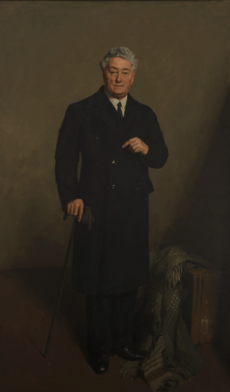
In the 1931 Australian federal election, Lyons and the UAP promised stable and careful financial policies. They said they would fix the economy after what they called Scullin's poor management. The Labor Party was split, which helped the UAP.
The UAP won a huge victory. Joseph Lyons became Prime Minister in January 1932. He was the third former Labor leader to become a non-Labor Prime Minister.
After the UAP lost some seats in the 1934 Australian federal election, Lyons invited the Country Party to form a full coalition government. Earle Page became the Deputy Prime Minister. The government won a third term in the 1937 Australian federal election.
Lyons was very good at campaigning. He used new technologies like radio, film, and air travel to reach voters. He also met often with journalists to get good publicity.
Managing Australia's Economy
Prime Minister Lyons believed in "sound finance." This meant he was against inflation and government debt. He thought it was important to have balanced budgets and pay back loans in an orderly way.
Lyons appointed himself Treasurer of Australia at first. He was the first non-Labor Prime Minister to do this. His plan to fix the economy was similar to the "Premiers' Plan" that had caused the Labor Party split. It involved reducing the value of the Australian dollar, cutting public servants' wages, and reducing government spending.
His first budget in 1932 cut pensions and public servants' wages. But later budgets reversed wage cuts and offered tax cuts. Australia recovered from the Great Depression faster than some other countries.
In 1933, Western Australia voted to leave Australia. Lyons campaigned against this, and the federal government said it was not allowed. In July 1933, Lyons created the Commonwealth Grants Commission. This group gives fair advice on how federal money should be shared with the states.
Foreign Policy and Defence
Joseph Lyons had no experience in international relations before becoming Prime Minister. But he became very interested in foreign policy. His government focused on "appeasement and rearmament." This meant trying to avoid war by making agreements with other countries, and also building up Australia's military.
Lyons increased Australia's defence budget before World War II. He wanted to avoid another war like the First World War. He was especially concerned about relations with Italy and Japan, as these could affect important trade routes.
During the 1930s, Australia started to realize that its interests might not always be the same as Britain's. Lyons sent Australian representatives to Asian countries and the United States. He also suggested a "Pacific Pact," which was an agreement for peace among the major powers in the Pacific. These actions showed Australia was moving towards a more independent foreign policy.
Lyons was Prime Minister during the Edward VIII abdication crisis in 1936. He was against King Edward VIII marrying Wallis Simpson and leaving the throne. Lyons is the only Australian Prime Minister to have served under three different monarchs.
Death in Office
(2) Funeral procession
(3) Coffin being loaded onto HMAS Vendetta for transport to Tasmania
On 5 April 1939, Joseph Lyons had a heart attack while traveling from Melbourne to Sydney. He was rushed to St Vincent's Hospital in a very serious condition. He died on the morning of 7 April, which was Good Friday.
Lyons was the first Australian Prime Minister to die while still in office. There was no clear rule about who should become Prime Minister next. Earle Page, the leader of the Country Party and the acting Deputy Prime Minister, became Prime Minister temporarily. The UAP then chose Robert Menzies as their new leader, and he became Prime Minister on 26 April.
Personal Life
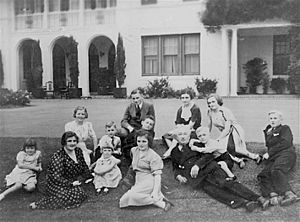
On 28 April 1915, Joseph Lyons married Enid Burnell. She was almost 18 years younger than him. They had twelve children together.
Years after Joseph Lyons' death, his wife Enid also became a politician. She was the first woman elected to the Australian House of Representatives and later served in the government. Their sons, Kevin and Brendan, also entered politics in Tasmania. Their grandchildren include Libby Lyons, who leads a government agency, and Kevin Lyons Jr., who became a judge.
Legacy and Honours
Joseph Lyons was one of the most popular Prime Ministers Australia has ever had. His death caused great sadness across the country. He was known for his friendly and relaxed personality. He was a devoted Catholic and the second Catholic Prime Minister.
Lyons is the only person in Australian history to have been Prime Minister, a state Premier, Treasurer, and Leader of the Opposition in both the federal and state parliaments. He is also the only Prime Minister who came from Tasmania.

In 1932, Lyons was made a member of the Privy Council of the United Kingdom, which is a special honour for Prime Ministers. In 1936, he was given the title of Companion of Honour (CH).
After his death, a suburb in Canberra was named Lyons in his honour. In 1975, Australia Post put his picture on a postage stamp. His old political area, Wilmot, was renamed the Division of Lyons in 1984, honouring both him and his wife Enid. His birthplace in Stanley and his family home in Devonport are now heritage sites.
Images for kids
-
Lying in state at St Mary's Cathedral, Sydney
See also
 In Spanish: Joseph Lyons para niños
In Spanish: Joseph Lyons para niños
- List of prime ministers of Australia
 | William Lucy |
 | Charles Hayes |
 | Cleveland Robinson |



